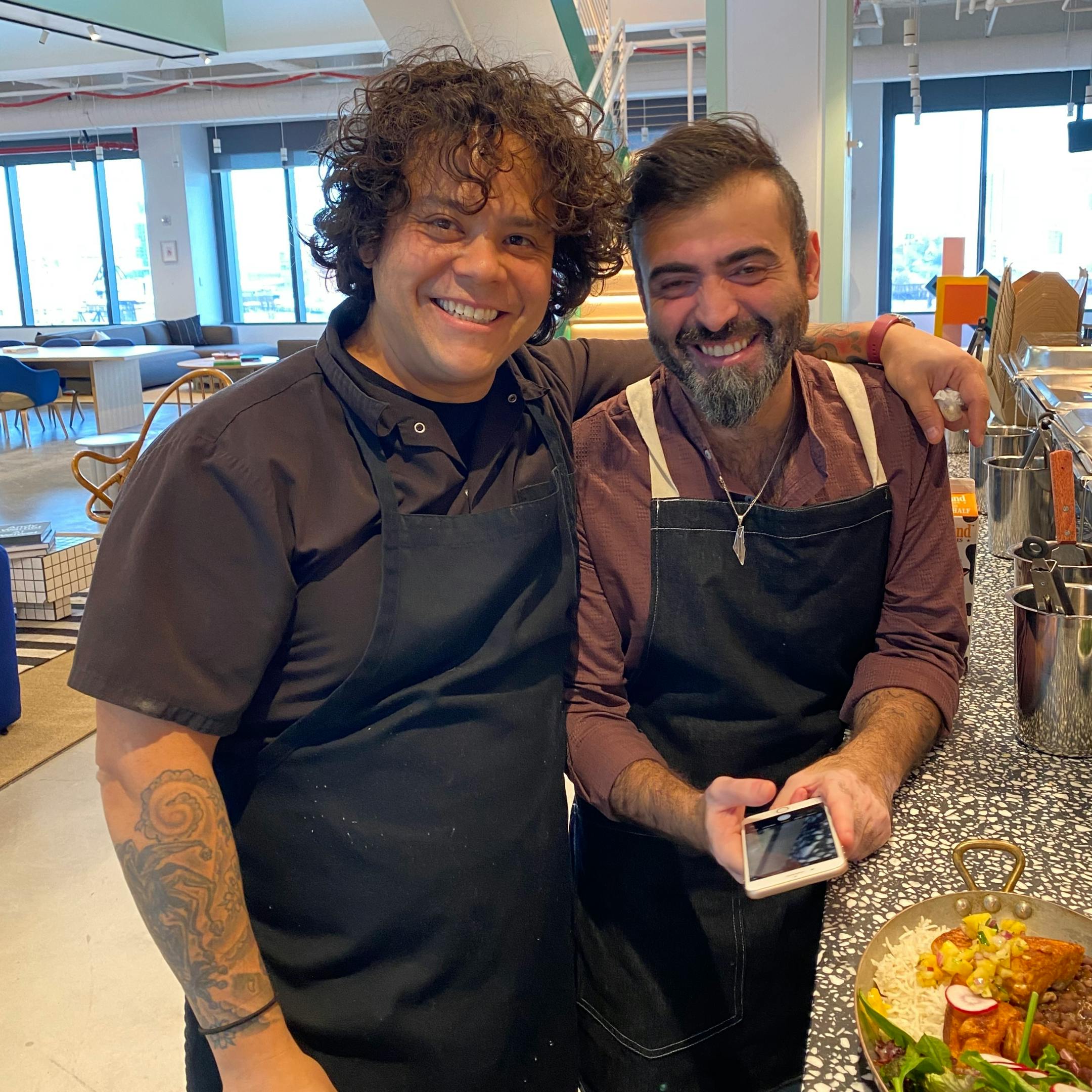
The Migrant Kitchen: Doing Good While Eating Well
By Jan Newberry
January 11, 2022
The Migrant Kitchen, Territory’s newest culinary partner, began as a catering business with a mission to give back to the community. The founders, Dan Dorado, a chef with over 25 years of experience, and Nasser Jaber, who has a background in diplomacy and had worked on emergency relief for refugees, committed to hiring recent immigrants and addressing New York City’s hunger crisis by offering meals to people in need. The idea was to merge restaurant culture with philanthropy.
Dorado and Jaber are equally serious about their food. The Migrant Kitchen now boasts two brick-and-mortar restaurants, with a third on the way. New York Times restaurant critic Pete Wells called it one of Manhattan’s most original restaurants. The Arab-Latino menu reflects the backgrounds of the partners—Dorado is Mexican and Jaber is from Palestine, and their collaboration has brought to life such cross-border mashups as pork carnitas shawarma and grilled halloumi and chorizo bowls. And now their za’atar salmon, chicken torta bowl, and stuffed eggplant are available to Territory customers in New York, New Jersey, and Philadelphia.
We sat down with Dorado and Jaber to find out more about their mission.
What was your original idea for The Migrant Kitchen?
We knew from the start that we wanted to do more than simply open a restaurant. We wanted to build a business that could have a positive impact on the community and our employees, and hold true to our values. The idea was to run a catering business that would showcase our food—a fusion of Latin and Arab cuisine that reflects our own backgrounds while providing opportunities for immigrants with jobs that paid more than minimum wage.
The Migrant Kitchen was just a few months old when the Covid-19 pandemic hit. How did that affect your business?
The first thing we had to do was figure out what to do with the 1,000 meals we had in our kitchen from an event that was canceled. We donated them to healthcare workers at a local hospital. That was picked up by a local newscast and helped us raise enough money on GoFundMe to keep the business going.
We partnered with the New York City Department of Aging and in addition to hospitals, we were sending meals to food pantries, homeless shelters, senior centers, and public housing complexes. Because so many food businesses had closed we were able to get access to unused kitchens around the city. We also got funding from private donors and nonprofits. When we needed more space, we rented unused refrigerated shipping containers and put them on the street.
The pandemic solidified our mission and showed us the right way forward. Over the course of just a few months, we were serving as many as 60,000 meals a week to the food insecure and frontline workers in New York. Their business grew to a level that otherwise would have taken five years to achieve.
How does your policy of hiring immigrants affect your business?
Talk about the spice road, our kitchen is staffed with people from all over the world. They are a natural outgrowth of where our story began and the heart and soul of our food. They help keep us honest by making sure we’re serving culturally appropriate food and respecting cultures while still being creative.
Our staff earns up to $25 an hour, and because many of them are undocumented, we work with attorneys who protect them from deportation.
Culture is a priority for us. We have a push-back policy that encourages everyone to speak up about our process. We make all decisions together as a team and make sure that even the newest members contribute.
You also established The Migrant Kitchen Initiative. Tell me about that.
The Migrant Kitchen Initiative, our 501c3 foundation, began with a group of industry friends using their free time and food reserves at the start of the pandemic shutdown to make meals for others in the community going through those hard times. Now we’re New York’s largest restaurant-quality cooking operation providing nearly 10,000 meals a day to food-insecure communities across the city. But our work keeps growing and we’re now working in 23 cities across 3 countries, In 2020, we served over 2.5 million meals to people in need. We’ve been lucky to find some incredible partners and private donors who cover our operating costs so that all our donations go to feeding those who need it most.
Enjoyed this insight into a top chef's mindset? Check out our Q&A With Chef Meski Worku or our Q&A with Chef Jawaun Wilkerson